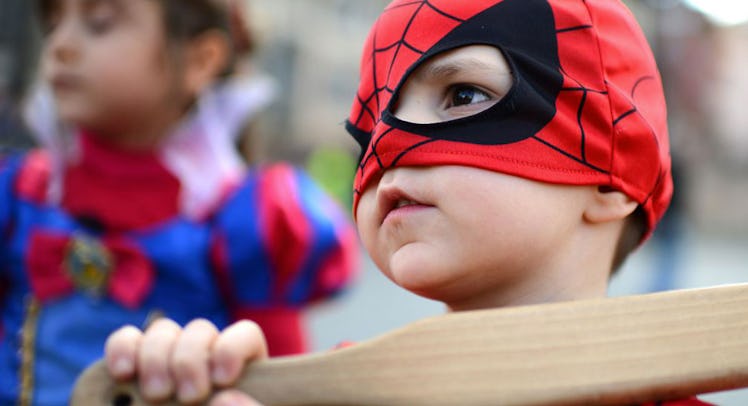Sorry Kid, Adults Took Superheroes and They’re Not Giving Them Back
Child-appropriate heroes are in the minority. They are an afterthought. They represent both a fraction of the revenue and a fraction of the attention.

I was ten years old when Superman died. Always a planner, I pre-bought that DC storyline.Every Sunday my mother would drive me to Willow Grove Mall to pick up the latest edition from my local comic book store, which I would read immediately (a memory I still associate with the feel of carpet and an a feeling of ineffable sadness). But it was different when I brought home Volume 2, Issue #75. It was released in January and I was torn between opening the polybagged collectible to discover how Kal-El would meet his demise and preserving both its value and my own ignorance. After some deliberation, I tore open the bag, thus presaging a life spent in pursuit of momentary pleasure at the cost of long-term gain.
Maybe it was worth it. For superheroes at that time — not just Superman and Batman, but also the Avengers, the X-Men and weird ones like The Maxx and Spawn — were the manna to an unhappy childhood. It wasn’t that these characters were carefree or cheery. Perhaps they weren’t even good. (According to the Internet, comics in the 1990s were terrible.) But they were all I knew and, more importantly, they were made for me and my cohort. The superhero universe was built for kids. Though there were adult comics at the margins, the aisles of the comic book stores I loitered in were tiled with age-appropriate villainy and heroism. Adults in comic book stores were lurkers and weenies and, rightly, regarded with suspicion.
Cut to a quarter-century later. My own sons are budding comic book fans. But, in the interim between their childhood and mine, superheroes have changed. They got older, grittier, and more profit motivated.
But my children are awash in Superman, Batman, and Captain America logoed shit, from masks to shirts to backpacks to books to books-that-aren’t-books-but-are-actually-toys to, of course, straight-up toys. Merchandising has grown to a many billion profit center for Marvel which, since 2009 has been owned by Disney. But, though children can now have their parents buy an endless cavalcade of merchandise, the actual lives of the superheroes they worship is not for them to explore.
The other day we were on the subway platform and my kid saw a poster for Logan, the latest and certainly darkest installment of the X-Men franchise. Starring Hugh Jackman as a jacked-up alcoholic Wolverine, it’s a fucking dark, gore-fest of a film. Beautiful, for sure, but also it’s a harder R than Flo Rida’s “Low.” I wish I could say my 5-and-a-half-year-old son was surprised when I told him couldn’t see it yet, that it was inappropriate. But it’s been years since he’s been able to see a Marvel movie. Sometimes when I forget to switch over the Netflix account, he catches sight of Daredevil or Luke Cage or Batman v. Superman (which no one should see), and I have to explain that though these heroes bear the insignias on his t-shirts, backpacks, and toys, he can’t hang out with them. They’re a bad crowd.
This isn’t to say there aren’t child-appropriate ways to I.V. drip superheroes into his veins. The broad-jawed heroes of Justice League are just fine. Plus, there’s a whole range of nice simplified books that teach him to read. But these child-appropriate heroes are now in the minority. They are an afterthought. They represent both a fraction of the revenue and a fraction of the attention. By and large, we adults have ganked our children’s heroes.
What does the colonization of superhero-dom by adults teach kids? Mostly that they should regard adults with suspicion. They giveth and they taketh away if it’s profitable. Superheroes teach kids that adults do not have magic at heart, but rather Mammon. They also teach them that kid stuff, the stuff that they are surrounded by, is knock-off or degraded or pasteurized. They learn about marketing.
Maybe can help us teach children that people are complicated. After all, fathers and mothers have work personas and kid-friendly home personas and there’s nothing wrong or hypocritical about that. Maybe the Superman with the clean lines and barrel chest is one avatar of a much more complicated individual. But isn’t that a lesson they were going to learn anyway? I suspect the answer is yes and I suspect that I should feel guilt for my complicity in the theft of my children’s heroes.
As for me, it was only a matter of time before I learned that Superman hadn’t really died. He was resurrected, briefly, as four mediocre ersatz Superman in the Reign of the Supermen story arc, before D.C. scrapped the whole death thing and brought back the man in blue. I was left with a worthless tear-stained comic book, a silly little armband and the knowledge that emotions could, and would be, exploited for profit.
Superman didn’t die that day, my love for him didn’t survive his resurrection. Still, I did loved him and, for a time, he was mine. My children won’t even have that. Superman, Batman, and the X-Men can’t truly transport them. That universe is not theirs at which to marvel.
This article was originally published on